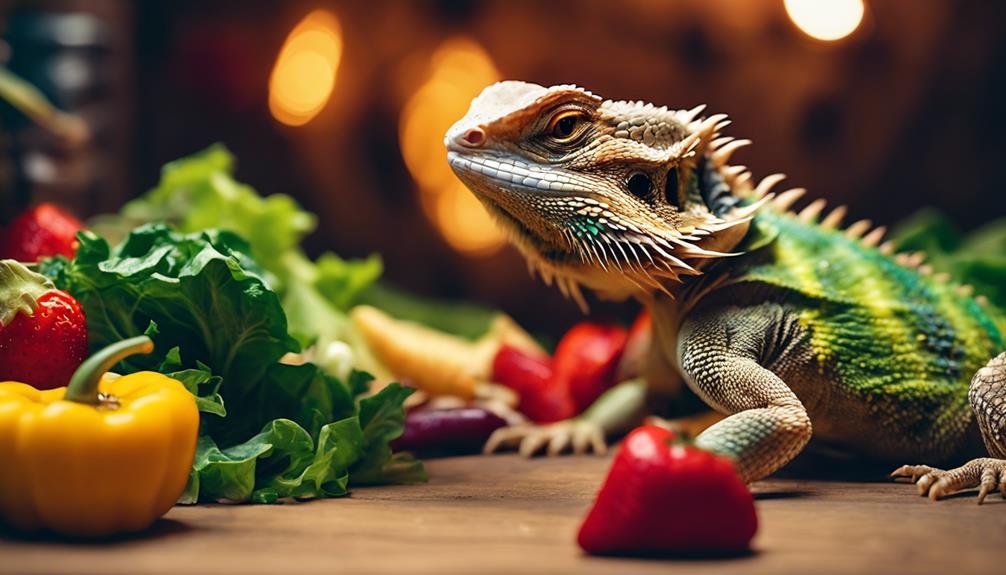When considering what you can feed your bearded dragon, it’s important to understand the balance between animal proteins and vegetables required to maintain their health. While you might know that juveniles need more protein-rich insects like crickets and mealworms, did you know adults thrive on a vegetable-heavy diet? Initiating this shift at the right age is essential, but the specifics, like when exactly to change and which vegetables are best, can greatly impact their wellbeing. What might be less clear is how to supplement these basics to prevent common health issues, a topic worth exploring further for the sake of your scaly friend’s health.
Key Takeaways
- Bearded dragons should eat a mix of live insects like crickets, mealworms, and roaches for protein.
- Juveniles require 30% vegetables in their diet, while adults need 75%.
- Dark leafy greens, squash, and bell peppers are essential vegetable choices.
- Fruits like apples, blueberries, and watermelon should be given as occasional treats.
- Always ensure food items are pesticide-free and appropriately sized to avoid health risks.
Bearded Dragon Food List
Let’s explore the specific foods you can provide your bearded dragon to guarantee a nutritious and balanced diet. For juvenile bearded dragons, their diet should consist largely of animal protein. However, it’s important to include vegetables early on to prevent metabolic bone disease—a common health issue stemming from nutritional deficiencies. The bearded dragon diet chart suggests that juveniles need about 30% of their intake as vegetables, which should be increased as they mature.
As adult bearded dragons, the focus shifts more towards vegetables, making up about 75% of their diet. Commonly recommended veggies include collard greens, mustard greens, and bell peppers, all of which are rich in essential nutrients. You should also gut load any insects before feeding them to your bearded dragon to enhance their nutritional content.
Fruits should only be offered sparingly, as treats, due to their high sugar content. Suitable fruits include blueberries, mango, and watermelon. This balance helps in preventing obesity and maintaining overall health.
Insects for Bearded Dragons
Bearded dragons thrive on a diet that includes a variety of insects such as crickets, mealworms, and roaches, which provide essential protein and nutrients. You’ll want to make sure these insects are part of your pet’s regular diet to maintain their health and vitality.
Insects like CalciWorms are particularly important since they’re rich in calcium and low in fat, offering the minerals your bearded dragon needs without the risk of obesity. Another excellent choice is Vita-Bugs crickets, known for their high nutrient content that supports the well-being of bearded dragons. These crickets are fortified with additional vitamins and minerals, enhancing their nutritional value.
When it comes to mealworms, they’re not just a tasty treat; they also supply essential proteins and vitamins that contribute to the diet of your bearded dragon. However, it’s essential to practice gut-loading, which involves feeding these insects nutritious foods before they’re given to your dragon. This process ensures that the insects pass on the maximum amount of nutrients to your bearded dragon, making every meal enriching and beneficial.
Vegetables for Bearded Dragons
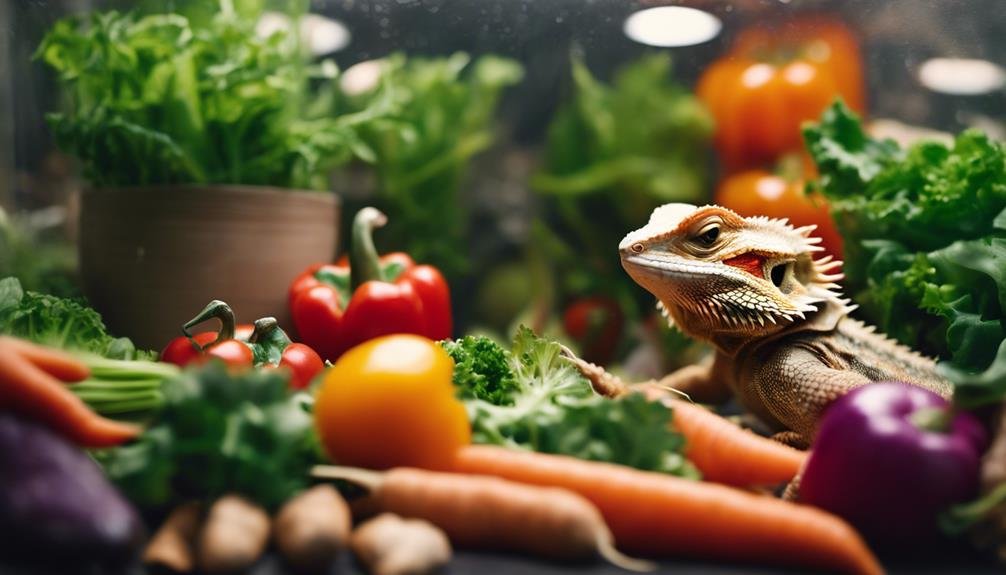

In addition to insects, your bearded dragon’s diet should include a variety of vegetables to provide essential nutrients. Dark leafy greens, especially collard greens, are fantastic as they’re packed with vitamins and minerals that are beneficial for your pet. Adding different types of lettuce like Romaine, Boston, and red leaf can offer some variety. These are lighter options that shouldn’t be the mainstay but can complement the nutrient-dense staples.
You’ll also want to mix in some alfalfa sprouts and dandelion leaves, which can liven up your bearded dragon’s meal with different textures and flavors. However, it’s important to keep things balanced; introduce these items gradually and in moderation to monitor how your dragon reacts.
For more substantial vegetables, include squash, sweet potatoes, and bell peppers in their diet. These should be provided sparingly to prevent overloading on certain nutrients that could lead to health issues, including impaction. To minimize the risk of impaction, always chop these vegetables into small, manageable pieces that your bearded dragon can easily consume. This helps ensure they’re not only getting a diverse diet but also one that’s safe and healthy.
Fruits to Feed Bearded Dragons
While vegetables are essential for your bearded dragon’s health, you can also offer fruits like apples, bananas, and watermelon as occasional treats. Introducing fruits into your bearded dragon’s diet provides not only variety but also essential nutrients. However, it’s important to serve these in moderation due to their high sugar content.
Fruits such as grapes, blueberries, and raspberries can be delightful treats for your bearded dragon. You should always cut these fruits into small, bite-sized pieces to make sure they’re easy for your bearded dragon to consume. This prevents any risk of choking and aids in digestion.
Keep in mind that fruits should only be given a few times a week as a treat or dessert. It’s not just about controlling sugar intake; it’s also about maintaining a balanced diet that mainly features vegetables and appropriate protein sources.
Before making any significant changes to your bearded dragon’s diet, it’s wise to consult with a vet. They can provide personalized guidance on how to properly incorporate fruits and make sure that your bearded dragon’s overall nutritional needs are being met. This vet consultation can help you avoid any potential health issues related to improper feeding practices.
Supplements for Bearded Dragons
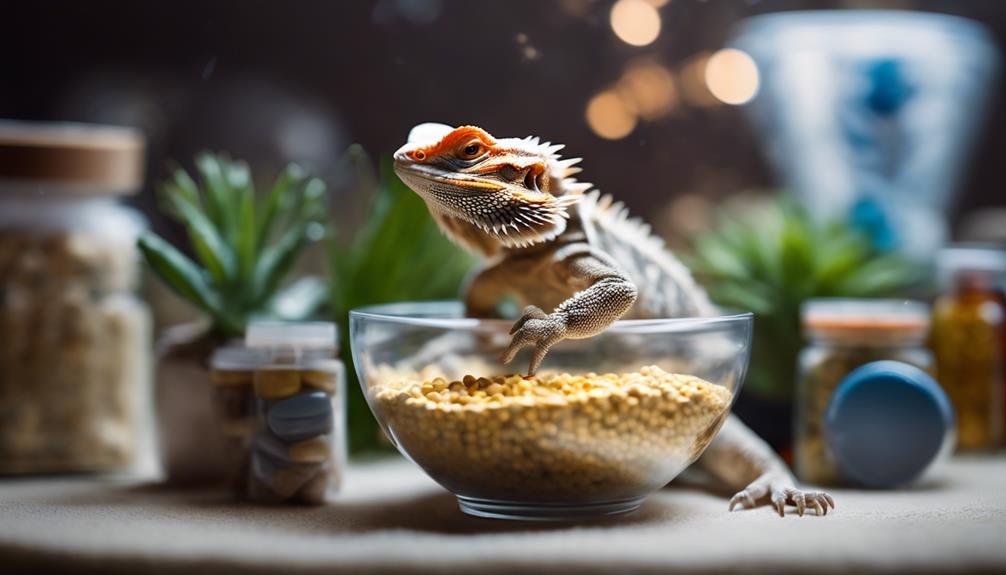

In order for your bearded dragon to maintain strong bones and overall health, you’ll need to include calcium and vitamin D3 supplements in their diet. These essential supplements come in powder form, making it easy for you to dust them on insects and greens that you feed your pet. This method guarantees your bearded dragon absorbs these critical nutrients effectively.
It’s important to follow a proper schedule for supplementation, as recommended by a veterinarian. They can tailor a plan specifically for your dragon’s unique needs, considering their age, health, and dietary intake. Remember, inadequate supplementation can lead to significant health issues, such as metabolic bone disease, which is common in reptiles that lack sufficient calcium and vitamin D3.
To prevent these health problems, consistently apply the calcium and vitamin D3 powders to your bearded dragon’s meals. Most pet stores supply these supplements, so you won’t find it hard to get what you need. By staying committed to a regular supplementation routine, you’re helping ensure your bearded dragon enjoys a robust and healthy life.
Food Group Ratios
After guaranteeing your bearded dragon gets the right supplements, it’s also important to focus on the balance of their daily diet. For adult bearded dragons, the ideal diet should consist of about 75% vegetables and 25% insects. This ratio ensures they’re getting a variety of essential nutrients crucial for maintaining good health and preventing health issues.
Juvenile bearded dragons, on the other hand, have different nutritional needs to support their rapid growth and development. Their diet should be richer in protein, consisting of 70% insects and 30% vegetables. This helps them build the necessary muscle and bone structure during their formative months.
While fruits can be a tasty treat, you should offer them sparingly due to their high sugar content. Think of fruits as an occasional snack rather than a staple in their diet to avoid unbalancing the overall food group ratios.
Foods to Avoid
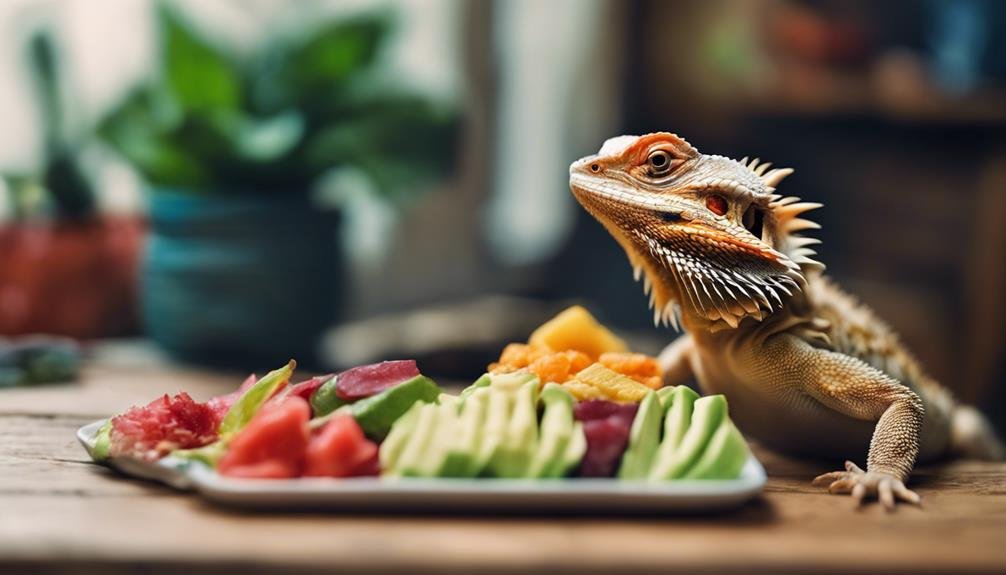

You should avoid feeding your bearded dragon avocado, rhubarb, and citrus fruits, as these can be toxic to them. These foods contain substances that can be harmful, and even fatal, to your pet. Avocado, for instance, contains persin, a fungicidal toxin that can cause heart failure and respiratory issues in bearded dragons. Rhubarb is equally dangerous as it contains oxalate crystals that can lead to kidney failure. Citrus fruits, while not as immediately lethal, are highly acidic and can disrupt your dragon’s digestive system.
Moreover, it’s essential to steer clear of high-oxalate vegetables like spinach, Swiss chard, and beet greens, especially in large quantities. These vegetables bind with calcium in the body, preventing its absorption and potentially leading to metabolic bone disease.
Be cautious of feeding your bearded dragon wild insects, which might’ve been exposed to pesticides. These chemicals can be deadly to your dragon. Also, avoid giving insects that are too large, as they can choke or cause digestive blockages.
Preparing Bearded Dragon Meals
To guarantee your bearded dragon thrives, start by selecting a variety of live insects and fresh greens for their meals. Live insects like crickets and mealworms are not just a source of protein; they also provide essential stimulation for your bearded dragon. Pair these with a selection of fresh greens, which are crucial for their vitamins and fiber content.
A balanced meal isn’t just about throwing together any vegetables or fruits you have on hand. You’ll need to be thoughtful about the mix, aiming for a diet that supports their health without inadvertently causing harm. Sweet potatoes and peppers, for example, add not only vibrant colors but also important nutrients and hydration to their diet. Remember, fruits should be used sparingly—think of them as a treat due to their high sugar content.
Here’s a simple table to help you balance their meals effectively:
| Food Type | Benefits | Frequency |
|---|---|---|
| Live Insects | Protein, stimulation | Daily |
| Fresh Greens | Vitamins, fiber | Daily |
| Vegetables | Additional nutrients | Several times/week |
| Fruits | Hydration, sweetness | Occasionally |
This approach guarantees your bearded dragon receives a well-rounded, nutritious diet.
How Much Should I Budget for Bearded Dragon Food?
When considering how much to budget for bearded dragon food, it’s important to factor in the cost of live insects, fresh greens, and commercial pelleted food. The bearded dragon price guide will give you an idea of the ongoing expenses, as these pets require a nutritious and varied diet for optimal health.
Finding Bearded Dragon Food
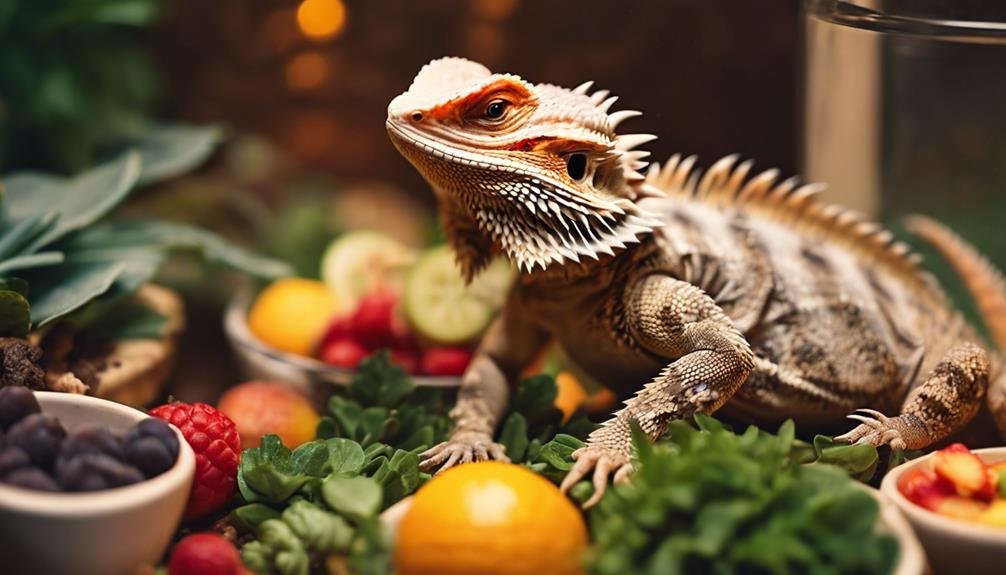

Finding nutritious food for your bearded dragon is essential, as a diverse diet supports their health and well-being. You’ll want to focus on a variety of foods that cater to their specific dietary needs, ensuring they receive all the essential nutrients required for a thriving life.
Here are some key components to include in their diet:
- Live insects: Opt for protein-rich options like crickets, mealworms, and earthworms.
- Leafy greens: Incorporate greens such as kale and parsley, which are packed with important nutrients.
- Vegetables: Add variety with safe choices like peppers and sweet potatoes.
- Fruits: Offer these as occasional treats, keeping in mind to limit the amount because of their sugar content.
- Balanced diet overall: Aim for a mix of protein, vegetables, and a small amount of fruits to promote overall health.
When sourcing bearded dragon food, it’s essential to make sure that live insects and leafy greens make up the bulk of their diet, complemented by vegetables and occasional fruit treats. This balanced approach helps maintain their health and prevents nutritional deficiencies. Remember, a well-rounded diet is the foundation of your bearded dragon’s health.
Conclusion
As a bearded dragon owner, you’ve got a variety of food choices to keep your pet thriving. Remember to balance their diet with protein-rich insects, nutrient-dense vegetables, and occasional fruits.
Don’t forget the essential supplements, especially calcium and vitamin D3, to avoid health issues. Be mindful of the foods to avoid and take care in preparing their meals.
By doing so, you’ll guarantee your bearded dragon enjoys a healthy, happy life under your care.

